On a July
night in Statesboro, Georgia in 1952, Joe Louis Reliford
made history—twice. He became the youngest player ever to
appear in a professional baseball game, and the first African-American
to play in the segregated Georgia State League.
For Joe, who was all of 12-years-old at the time, his
date with destiny was as unexpected for him as it was for the
crowd at the ballpark that evening. A baseball fan from the time
he could walk, Joe held no illusions about a career as a big leaguer.
But fate—and a no-nonsense team official named Charlie Ridgeway—intervened
when Joe was working as a batboy for the Class-D Fitzgerald Pioneers.
His stint in the GSL may have been brief, but its impact cannot
be ignored all these years later.
|
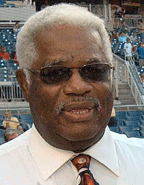
Joe Louis
Reliford
(photo by Robert Eubanks)
|
| |
|
| |
When
and where were you born and raised?
|
| |
|
| |
I was
born November 29th, 1939 in a little community called Ashton,
but I grew up in the town of Fitzgerald, Georgia. My mother’s
name was Luronie Gillis Reliford, and my father’s name was
Roscoe Reliford. My mother raised ten children—six girls
and four boys. I lost one of my brothers and one of my sisters
at a young age.
|
| |
|
|
| |
The name
"Joe Louis Reliford" honors the boxing champion. How
did you get this name?
|
|
| |
|
|
| |
I had
a brother named Willie living up North in Virginia. When he heard
my mom was having a baby, he told my parents to name me Joe Louis.
That was after Louis won the heavyweight championship. Most everyone
called me Joe Louis, instead of just Joe.
|
|
| |
|
|
| |
What
kind of work did people do in Fitzgerald?
|
|
| |
|
|
| |
Many of
the people in my community worked in the railroad shop, or at
hotels and service stations. There was also a lot of farming in
the area. Those who could not find work looked elsewhere.
My own
father went to work in Brunswick, Georgia in a gunpowder factory.
He would come home on weekends. He got sick on the job and passed
away when I was four. After my father died, my mom bought a little
house on Orange Street, two blocks from Monitor Elementary School.
In the other direction, about three blocks away, were the railroad
tracks and then the ballpark, Blue and Gray Park.
|
|
| |
|
|
| |
Did you
play a lot of sports when you were young?
|
|
| |
|
|
| |
Not really.
As little boys we might play cowboys and indians today, then play
ball tomorrow. We did a lot of cookouts, too. Also, when I was
a little boy, I helped my mom pick cotton. And when I was older,
I worked in the tobacco business.
|
|
| |
|
|
| |
You
were a fan of the Pioneers, the local minor-league club.
|
|
| |
|
|
| |
I was.
The Fitzgerald Pioneers were members of the Class-D Georgia State
League. The entire league was white. I remember some Cubans or
Puerto Rican players, but no blacks. The only African-Americans
in that ballpark during Pioneer games were the fans sitting down
there in a section along the right field line.
|
|
| |
|
|
| |
Why did
black fans pay their way into games that did not have any black
players?
|
|
| |
|
|
| |
It was
a love of baseball. And there was nothing else to do. It was just
somewhere to go—the big social event in a little small town.
Of course,
a lot of people did not buy tickets. They perched up in trees
or on top of cars. There was a metal fence all the way around
the ballpark, and you could climb it and hang over the top and
watch the Pioneers practicing. But once the game started, the
police came around and would run you off. My crew preferred to
watch from the railroad tracks. You couldn't see the players’
faces, but you could see the plays. Some people in major league
parks sit farther away.
|
|
| |
|
|
| |
Did
you watch night games when you were a little boy?
|
|
| |
|
|
| |
Yes, we
did. Normally, we had to be home before dark. So to see a night
game, we had to have some of the big boys from the neighborhood
go with us up on the railroad tracks. Blue and Gray Park had lights—the
whole east side of town would get lit up.
|
|
| |
|
|
| |
There
was a “colored” team in Fitzgerald, wasn’t there?
|
|
| |
|
|
| |
Yes. Fitzgerald
was a sports town—we loved our baseball. The Negro League
team was called the Lucky Stars. They had real good talent when
I was a boy.
As a matter
of fact, I got a chance to see Satchel Paige pitch in 1948 or
’49, after the big-league season ended. The Lucky Stars
played the Miami Clowns, New York Black Yankees—which was
really the same ball club—the Birmingham Barons, Philadelphia
Stars, Macon Peaches, Atlanta Black Crackers. I was so young,
I don't remember many games. I do remember Josh Gibson. He was
so famous I remembered seeing him when I was a little boy.
|
|
| |
|
|
| |
How
did you come to work for the Fitzgerald Pioneers?
|
|
| |
|
|
| |
One morning
in 1952, my mama was cooking breakfast for us in a big cast iron
pan. She suffered from rheumatoid arthritis, and she dropped the
pan. I picked it up for her and saw she was crying. I realized
I had to do something to help my mom.
I went
to Blue and Gray Park that day and asked who was the manager of
the team. They told me Ace Adams.
|
|
| |
|
|
| |
Adams
was a relief pitcher for the Giants during the war.
|
|
| |
|
|
| |
That’s
right. He was now a manager in the Athletics’ organization.
Fitzgerald was a farm club of the A’s.
Anyway,
I asked where he was, and I was pointed in his direction. I told
Mr. Adams I wanted to be the batboy.
“You
want to be the bat boy?” he asked. “Why?”
I said
I needed to help my mom. Mr. Adams said, “You know, I don’t
really have time today. Come back tomorrow and we'll talk."
|
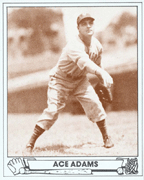 Ace Adams, 1943
Play Ball
Ace Adams, 1943
Play Ball |
| |
|
| |
And you
did.
|
| |
|
| |
Yes, the
next day after school I went back. Mr. Adams pointed to the field
and he asked, “Look out there, what do you see?”
I said,
“Nothing but a bunch of ballplayers.”
He said,
“A bat boy has to keep up with about two hundred bats."
I
told him I could do that. “
A bat
boy has to keep up with about a hundred balls,” he
said. I
told him I could do that.
“There
are twenty-eight ballplayers,” he said, “and each
one has to have his shoes shined before the game.” I
told him I could do that.
“The
team travels from town to town...” I said, “You have
to ask my mom about that."
|
| |
|
|
| |
So
your mother gave her permission for you to travel with the team?
|
|
| |
|
|
| |
Yes, she
did. We needed the money. But I didn't think about how much money
the batboy job paid. I just wanted that job. Afterwards, Mr. Adams
told me, “Joe Louis, you've got the job. Now let me get
you a uniform so you can be dressed like us.”
I was
twelve-years-old at the time. I was 4-11 and weighed 68 pounds.
I stood 5-8, 155 when I graduated from high school, and I weigh
275 now. But when I got that uniform, I brought it home and my
mom really had to alter it to fit me.
|
|
| |
|
|
| |
What
do you recall about Ace Adams?
|
|
| |
|
|
| |
Ace was
a good manager and real responsible man, kind and easygoing. He
didn't travel with us all the time. Charlie Ridgeway was the road
manager. He played second base. He was a good ballplayer, and
he was fast.
|
|
| |
|
|
| |
When
you look at Ridgeway’s stats, he looks like he had better
than Class-D talent.
|
|
| |
|
|
| |
I always
wondered what he was doing in that league. The man could hit,
run, and catch.
|
|
|
|
|
|
| |
You
had a close relationship with him.
|
|
| |
|
|
| |
Yes, I
did. He didn’t treat me like a batboy. He treated me like
I was his son. I wanted to be just like him. So I wanted to play
second base, I wanted to run like him.
I didn't
see any difference between the way he treated me and the way he
treated the ballplayers. He expected me to hustle, and when I
was done with my duties, he would tell me to go out and take grounders
and shag flies.
I became
very good considering my size. After a while he let me warm the
pitcher up.
|
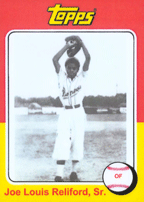 Joe Louis Reliford,
Joe Louis Reliford,
2008 Topps |
|
|
|
| |
You
weighed 68 pounds, and you were warming up professional pitchers?
|
| |
|
| |
I did.
And they threw that ball hard. If you didn't catch it, it hit
you. So I caught it.
I became
a good catcher after a while. Anyway, Mr. Ridgeway knew I could
play.
|
|
|
|
|
| |
How
did the other players treat you?
|
|
| |
|
|
| |
Only one
or two didn't want anything to do with me. They were both pitchers,
and they couldn't win anyway. When they got pulled from the game,
I was the one they threw the glove at.
Other
than that, I felt like a member of the Pioneers. When they gave
out meal money for the ballplayers, they gave me meal money, too.
When we stopped at a restaurant, and they wanted me to eat in
the kitchen, Mr. Ridgeway said, “He's a ballplayer like
the rest of us, so he eats with us.”
If the
place objected, he would take the team out of the restaurant and
go somewhere else.
|
|
|
|
|
|
| |
All
this leads up to the historical night of July 19th in Statesboro.
|
|
| |
|
|
| |
Right.
We took the bus to Statesboro, which is about 100 miles away.
It was Elks Night, so there were a lot of people in the
stands that evening. Fitzgerald was losing badly. We could not
score a run. The score was 13–0. The fans were feeling good,
and they wanted to rub it in. Every time I ran out to pick
up a ball or bat, they kept yelling, “Put the batboy in."
|
|
|
|
|
|
| |
Were
a lot of people drinking?
|
|
| |
|
|
| |
I don't
know if they were drunk or who all was there. But I'll tell you
that park was full—maybe five or six thousand people.
|
|
|
|
|
|
| |
All
white?
|
|
| |
|
|
|
|
I know
there were some black folks in that stadium, but I don’t
remember seeing any.
|
|
|
|
|
|
| |
So
as Statesboro piled it on, the fans got more and more boisterous?
|
|
| |
|
|
|
|
Yes, and
by the eighth inning, I guess Mr. Ridgeway got tired of listening
to them. So he told me I would be pinch-hitting for Ray Nichting.
Now Ray Nichting wasn’t some ordinary ballplayer. He was
our Mickey Mantle. He was good player. I looked at Mr. Ridgeway,
not sure what to do.
“Get
you a bat and hit that ball,” he ordered. So I grabbed a
fungo bat—which was the lightest one we had—and told
the umpire I would be hitting for Ray Nichting.
|
|
|
|
|
|
| |
What
was the umpire’s reaction?
|
|
| |
|
|
|
|
He had
on his mask, so I couldn’t see whether he was smiling or
not. But he said, “Go ahead, get in there Joe Louis."
|
|
|
|
|
|
| |
Who
was pitching?
|
|
| |
|
|
|
|
I'll never
forget him, Curtis White. I expected him to throw to me like I
was a twelve-year-old. Well, he burned in a fastball. When he
threw that first ball hard to me, I realized this was no fun and
games anymore. I said to myself, “He's trying to show me
up!” Then I said to myself, “The next fastball
I get I'm hitting out of the park!” You know how it is when
you’re a kid. Well, I hit the next pitch down the line.
The third baseman backhanded it and threw me out by a step.
|
|
|
|
|
|
| |
What
did the crowd do?
|
|
| |
|
|
|
|
They went
wild! Well, it took a while for things to settle down. Meanwhile,
I returned to the dugout, the players congratulated me, and I
went back to doing what a batboy does. After we made the third
out, Mr. Ridgeway handed me Nichting's glove and said, “Hey,
you're playing right field."
|
|
|
|
|
|
| |
Did
you think he was serious?
|
|
| |
|
|
| |
I said,
“Man, we can't do that—we're breaking the law.”
He said,
“That's the way it is."
|
|
|
|
|
|
| |
So
you took the field?
|
|
| |
|
|
| |
Back then,
when a white man told you to do something, you did it.
|
|
|
|
|
|
| |
When
you went out to your position, were you praying a ball didn't
come your way? How did the bottom of the eighth
unfold?
|
|
| |
|
|
| |
On the
contrary, I was hoping I would get a ball so I could show my arm
off. I had a great arm for a twelve-year-old. The people in the
stands were still laughing. They didn't know I could play.
The first
batter popped up to the left fielder. The second batter hit a
ground ball into centerfield and got on first base. The next batter
hit a ground ball through the infield to me. The runner on first
base should have stopped at second, but he must have thought that
a little child couldn’t throw him out, so he rounded second
to take the extra base. When he got to third the ball was waiting
for him. He was out. I threw him out on the fly.
The fans
hollered again, “Sign him up! Sign him up!” They were
having a good time now.
The next
man was Jim Shuster. I didn't know it at the time, but he was
trying to keep a twenty-one-game hitting streak alive. He batted
right-handed but had power to right field. In the dugout they
waved me around to the line.
Sure enough,
Shuster hit a slicing line drive out there. I ran back to the
fence, which was about five feet high. I know that because it
came about even with my head. The ball would have just cleared
the fence for a home run, but I put my glove up and caught it
before it left the ballpark.
|
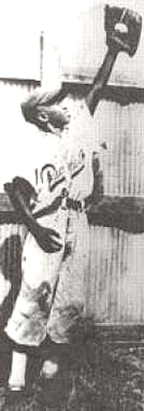 Joe Louis Reliford
Joe Louis Reliford
|
|
|
|
| |
What
happened next?
|
| |
|
| |
The bleachers
emptied. All those white folks were coming right to me! I started
to holler. It frightened me to death. I was a little boy. They
grabbed me and I didn't know what to do—I was so scared—I
knew I couldn't beat all those people. They were slapping me from
my head to my feet. I was crying.
Finally,
Mr. Ridgeway made it out to me, and I felt better. He grabbed
me and rushed me into the dressing room. I finally caught my breath
when someone said, “Look here, Joe Louis—you're pockets
are full of money! ” Those fans had been stuffing bills
and coins into my pockets.
When the
game was over, I was still in shock. I didn't even change out
of my uniform. I sat next to Mr. Ridgeway on the bus ride home.
|
|
|
|
|
|
| |
What
was that ride like?
|
|
| |
|
|
| |
Mr. Ridgeway
told the team on the bus, “If you ever make it to the major
leagues, you can say you played with the youngest player in history.”
After finding out that life is like it is, I thank God for people
like Charlie Ridgeway. I was so proud of him that night.
|
|
|
|
|
|
| |
There
is a famous picture of you catching the ball in right field. It
is different than how you described it?
|
|
| |
|
|
| |
That’s
because it was staged by a photographer, who took it in our home
park the next day. And what a day that was—there were reporters
and photographers at home, at school, wherever I went. It was
something I wasn't used to.
|
|
|
|
|
|
| |
The
commotion was all about a twelve-year-old boy in a professional
game. Did it occur to anyone that you hade just desegregated the
Georgia State League?
|
|
| |
|
|
| |
I don’t
think so. I didn’t really think about it until I was a grown
man. You see Jackie Robinson had broken the color barrier with
Montreal in 1946 and with the Brooklyn in 1947. I did what I did
in 1952.
I like
to think that I helped break the ice for African-American players
in the Deep South. Hank Aaron, Frank Robinson and Willie McCovey
all played minor league ball down here on their way to the majors.
|
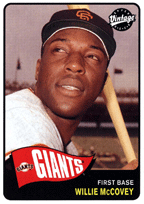 Willie McCovey,
Willie McCovey,
2003 Upper Deck Vintage |
|
|
|
| |
What
was the fallout for Ridgeway and the umpire?
|
| |
|
| |
The league
suspended and fined Mr. Ridgeway, and I think the umpire was fired.
The people of Fitzgerald took up a collection and paid Ridgeway’s
fine. A couple of months later, at the end of the season, Mr.
Adams came into the clubhouse and let a couple of players know
that they were being released. He came to me and said, “I
know you weren’t the cause of it, but we have to release
you.” I guess word had come down from the A’s.
|
|
|
|
|
| |
What
was you next move?
|
|
| |
|
|
| |
That was
when I went over to the Lucky Stars. They were owned by a fellow
named Sinclair Coffey and his partner, Mr. Johnson. The following
spring, Mr. Johnson and Mr. Coffey took me down to Jacksonville
to see if they could get me on the Braves team.
|
|
|
|
|
|
| |
As
a thirteen-year-old?
|
|
| |
|
|
| |
Yes. They
were serious. They knew I could play, and wanted me to move up
a notch or two to play with the big boys in Jacksonville. I sat
on the bench the whole game and didn’t get in. Well, those
boys could play. Hank Aaron—they called him Henry then—was
the shortstop on that team. I suppose it was something of a publicity
stunt. I was drawing people wherever I went—I was known
as the youngest professional baseball player. I was just doing
what my bosses told me to do.
|
|
|
|
|
|
| |
How
did you sports career unfold after that?
|
|
| |
|
|
| |
I graduated
from Monitor Elementary and then Monitor High School in Fitzgerald.
I played baseball, basketball and football, and also ran track,
although I wasn’t that fast. I scored 15 or 20 a game in
basketball. In football, I’d run right over you. I had nine
scholarship offers my senior year and decided to go play football
at Florida A&M for Jake Gaither.
Unfortunately,
I broke my collarbone in practice. That shot my football and baseball
careers. Since I had a scholarship—and two children to support,
Joe Jr. and Bobby—coach Gaither suggested I take some electronics
classes. I ended up being a phonograph technician and made a nice
living as a jukebox mechanic.
|
|
|
|
|
|
| |
You
live in Douglas, Georgia now. Did you move there from Fitzgerald?
|
|
| |
|
|
| |
No, I
actually left Fitzgerald for New York City in 1964. But I just
couldn't take New York, and after six months, I moved back to
Douglas, which is about 30 miles from Fitzgerald. My girlfriend,
Gwendolyn, was a schoolteacher there. We got married in 1967 and
had three children, Joel, Jeremy and Jeannie. I always wanted
me a Jeannie!
In Douglas,
I was a coach, a teacher, and later became the city’s third
black police officer. Then I worked for the county until my retirement
in 1998.
|
|
|
|
|
|
| |
By
then you were a part of the Baseball Hall of Fame. How did that
come about?
|
|
| |
|
|
| |
In 1990,
while I was working in the Sheriff’s office, Sports
Illustrated wanted to do an article on me. I also received
a letter from the curator of the Hall of Fame that said I was
going to be part of a minor league exhibit. The city of Douglas
flew me to Cooperstown so I could see the exhibit.
|
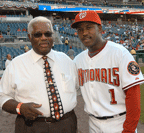 Joe Louis Reliford
&
Joe Louis Reliford
&
Willie Harris
(photo by Robert Eubanks) |
|
|
|
| |
You
have received a lot of awards and honors, and signed a lot of
autographs since then. When and how did Joe Louis Reliford become
a celebrity?
|
| |
|
| |
My wife
had suggested I put this stuff to work for me, and Bill Dean,
the Hall of Fame librarian, told me I should get three letters
confirming my story, and then send one to the Hall of Fame, one
to the Guinness Book of Records and one to Ripley’s
Believe It Or Not. I got the mayor of Fitzgerald, Gerald Thompson,
Mr. Ridgeway, and M.C. Pettigrew, my pastor, to write letters.
Well, it was like hitting the jackpot. God has been blessing me
ever since.
|
| |
|
|







